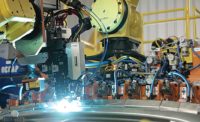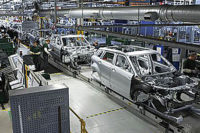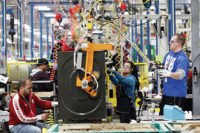Wichita, KS, calls itself the Air Capital of the World. The city has a long, proud heritage of aerospace manufacturing.
Industry leaders such as Airbus, Beechcraft, Boeing, Bombardier, Cessna and Spirit AeroSystems have operations in Wichita. That’s why Wichita State University’s College of Engineering created the Advanced Joining and Processing Laboratory (AJPL) in 2004.
The AJPL was established in partnership with the National Center for Aviation Training (NCAT) to facilitate industry-based technical and engineering education in automation. The laboratory focuses on ways to reduce weight and increase performance capabilities in aerostructural manufacturing.
“Our goal is to bolster industry-university R&D collaboration to reduce manufacturing costs and enhance structural performances for the aerospace industry,” says Enkhsaikhan Boldsaikhan, Ph.D., an AJPL research scientist. “[We also promote] hands-on experiences for engineering students in the areas of advanced joining processes and automation.”
The laboratory specializes in friction stir welding. According to Boldsaikhan, the joining process is ideal for welding the outer skin of aerospace structures since high-strength aluminum alloys can maintain excellent properties in the weld seams. This results in an enormous weight savings compared with traditional riveting techniques used for fuselage assembly.
In friction-stir welding, a rotating tool unites metals by softening their adjacent surfaces with friction heat while a probe, or pin, on the tool’s underside mixes their molecules together. There are no filler materials. Friction-stir welding makes its seams and joints lighter, yet strong, to withstand tremendous stresses during flight. The highly repeatable process can join a wide variety of lightweight metals, including aluminum, magnesium and titanium.
“The AJPL is one of the leading friction-stir welding (FSW) research groups in the nation,” claims Boldsaikhan. “The lab has conducted a multitude of projects that were primarily focused on FSW technologies. The access to the Wichita aviation cluster, as well as NCAT and the university’s National Institute for Aviation Research, gives the AJPL a unique opportunity to deploy theory and concepts associated with FSW in the aerospace industry.”
Engineers at the AJPL specialize in process development, weld tool design optimization, distortion control, corrosion enhancements and automation aspects of the FSW technologies. In addition, Boldsaikhan and his colleagues are working on refill friction stir spot welding as a rivet replacement technology. “These joints can be considered as integral fasteners since the joining process involves a thermomechanical processing of the workpieces to create a bond without using any foreign material,” explains Boldsaikhan.
The AJPL is also focusing on integral fastening, a solid-state forging process in which two or more metals are joined together without an external heat source. With the technology, the lab is aiming to reduce the use of rivets and other mechanical fasteners in aircraft wing panels, skin panels and fuselage joints.
“Integral fastening will be an innovative way to join aerostructure components,” claims Michael McCoy, assistant professor of mechanical engineering and AJPL director. “This process forges materials together to form an in situ joint stronger than that of traditional mechanical fasteners of the same size.”
Earlier this year, the AJPL installed a refill integral fastening system donated by Kawasaki Heavy Industries. Only two of the robotic systems exist in the world; the other one is in Japan. According to McCoy, the refill system produces a fastener with no head, hole, indention or upset in the aircraft skin, which strengthens metal connections. Also, the elimination of rivets means lower manufacturing costs and airframe weight, leading to lower operational costs.




